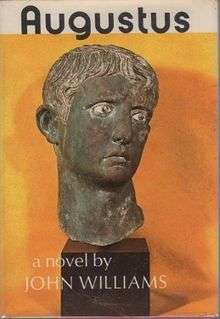Augustus (Williams novel)
 First edition | |
| Author | John Williams |
|---|---|
| Country | United States |
| Language | English |
| Publisher | Viking Press |
Publication date | 1972 |
| Media type | |
| Pages | 305 |
| ISBN | 0-670-14112-7 |
| OCLC | 513805 |
| 813/.5/4 | |
| LC Class | PZ3.W6744 Au PS3545.I5286 |
Augustus is an epistolary, historical fiction by John Williams published by Viking Press in 1972. It tells the story of Augustus, emperor of Rome, from his youth through old age.[1] The book is divided into two parts, the beginning chronicling his rise to power, the latter describing his rule thereafter, and the familial problems faced choosing a successor.[1] Williams and Augustus shared the 1973 U.S. National Book Award for Fiction with John Barth and Chimera, the first time the award was split, and the only of Williams' four novels to receive significant acclaim within his lifetime.[2]
Plot
Born Gaius Octavius Thurinus, the young future-emperor was adopted by his great-uncle, Julius Caesar, after demonstrating promising wit and skill. After his great-uncle's assassination, Augustus (at this time known as Gaius Julius Caesar Octavianus) took vengeance upon Caesar's murderers, and through tactical political moves, became one of Rome's three “Triumvirs" alongside Marc Antony and Marcus Aemilius Lepidus. After defeating the other two triumvirs, and obtaining sole power over the Roman State, Augustus (known as "Imperator" Caesar Divi Filius), began taking measures to secure and increase his power. As a result, Augustus gave orders to exterminate Cleopatra's teenaged son, allegedly commenting, "too many Caesars is no good thing." (As it was the common belief that her son was of Julius Caesar's bloodline.) In light of such orders, Cleopatra and Marc Antony—lovers at the time—committed suicide.[2]
The later part of the novel focuses more on Augustus' rule. It details his official renaming by the Roman Senate (augustus: one to be revered), his contention with and banishment of his daughter, Julia, for her various extramarital affairs, and closes with a final note from (the fictional) Augustus himself.
Major themes
The major theme Augustus addresses is the ability of circumstances to change the personality and behavior of a person.[3] The conditions that surrounded Augustus' rise to power plagued Ancient Rome with violence and contention, which led to Augustus working hard to implement a time of peace and cooperation in Rome, commonly referred to as the Pax Romana or the Pax Augusta. Other themes Williams writes on in his novel include coming of age and the difference between restraint and resignation.
Background
Augustus is the last work Williams published before his death in 1994. Though Augustus garnered little public recognition while Williams was alive, the critical reception of the work was generally positive. Augustus is different from Williams' other works in that it is his only piece in which the main character is not named William.[4] In addition, it is his first novel that takes place outside of the United States.[2]
Critical reception
Augustus was received with general positivity from critics across the country. Augustus garnered so much critical respect that it won the National Book Award in 1973. Williams and Augustus shared the 1973 U.S. National Book Award for Fiction with John Barth and Chimera, the first time the award was split.[5][6] Critics such as Harold Augenbraum discuss the split award in their work, saying that this was the first time the fiction award was split and also discussing that the 1973 National Book Awards allowed many categories to split the awards.
Both the Los Angeles Review of Books and the New York Review of Books offered positive criticism, particularly about the fusion of biography and fiction. Reviewer Daniel Mendelsohn of the New York Review of Books wrote that "the life of the first emperor is an ideal vehicle for a historical novel: Augustus is a figure about whom we know at once a great deal and very little, and hence invites both description and invention".[2]
Critics overwhelmingly praised the narrative of Augustus while critiquing the lack of time speaking Williams gives the title character. Overall, most critics praised Williams for forgoing his own personal voice to relay characters that are historical with personalities Williams imagines for himself and his audience.[2]
References
- ↑ Gray, John (29 August 2014). "The thinker's dictator: Emperor Augustus makes for Thrilling Fiction". Newstatesmen.com.
- 1 2 3 4 5 Mendelsohn, Daniel; Brown, Peter; Mendelsohn, Daniel; McGahern, John Williams, John (2014-08-14). "Hail Augustus! But Who Was He?". The New York Review of Books. ISSN 0028-7504. Retrieved 2015-10-28.
- ↑ "John Williams: Augustus". The Mookse and the Gripes. Retrieved 2015-10-26.
- ↑ Boyle, Brendan (14 August 2014). "The Truths of History". Wall Street Journal. Wall Street Journal. Retrieved 28 October 2015.
- ↑ "1973 National Book Awards Winners and Finalists, The National Book Foundation". www.nationalbook.org. Retrieved 2015-10-28.
- ↑ Pace, Eric (1973-04-11). "2 Book Awards Split for First Time; 'Serengeti' Lion' Wins Other Judges Shocked 'Multitudinous Relationships' 'Worlds in Collision' 'Joys and Delights'". The New York Times. ISSN 0362-4331. Retrieved 2015-10-28.
| Awards | ||
|---|---|---|
| Preceded by The Complete Stories Flannery O'Connor |
National Book Award for Fiction 1973 With: Chimera John Barth |
Succeeded by Gravity's Rainbow Thomas Pynchon |
| Succeeded by A Crown of Feathers and Other Stories Isaac Bashevis Singer | ||